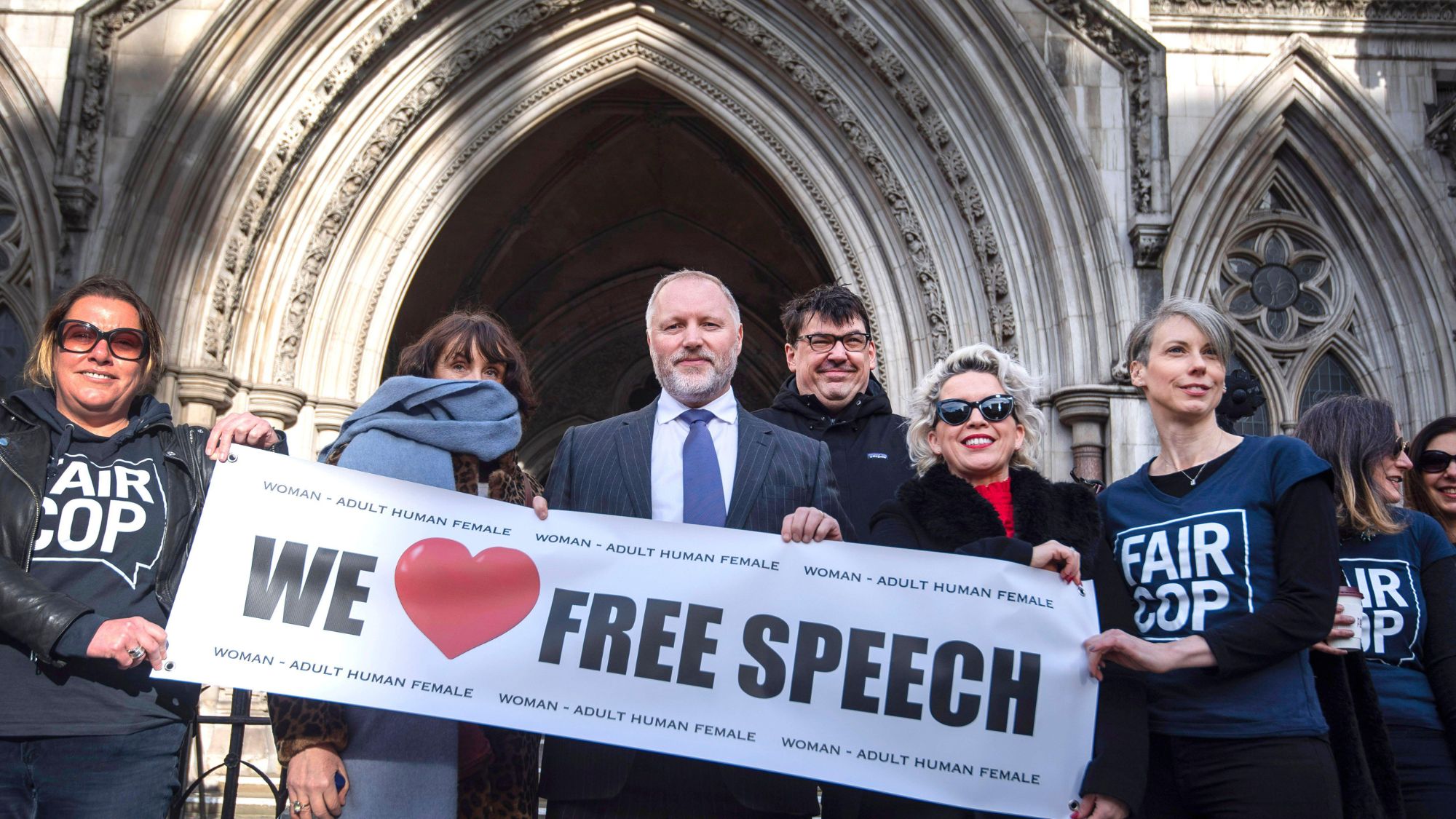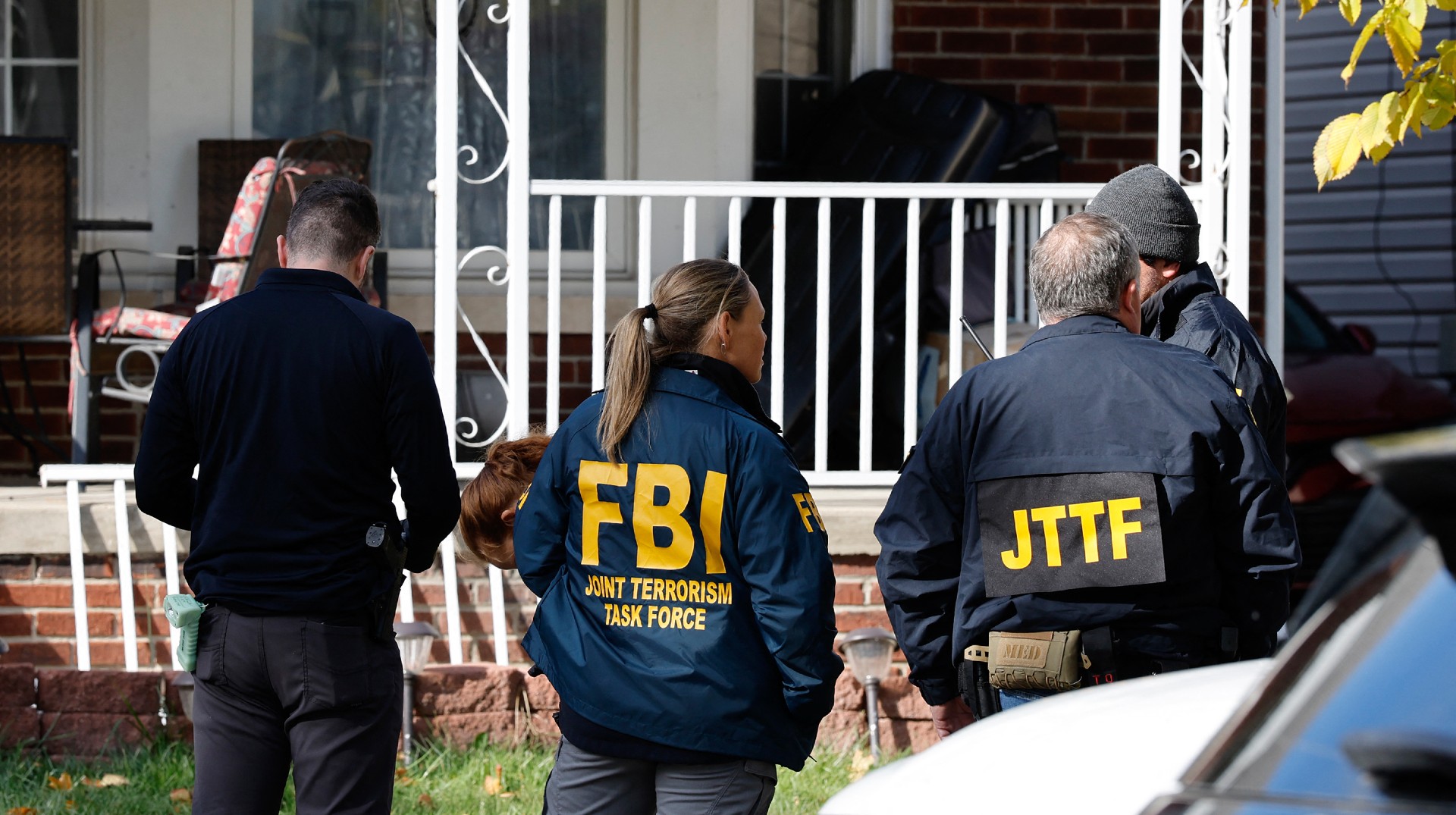NCHIs: the controversy over non-crime hate incidents
Is the policing of non-crime hate incidents an Orwellian outrage or an essential tool of modern law enforcement?

A free daily email with the biggest news stories of the day – and the best features from TheWeek.com
You are now subscribed
Your newsletter sign-up was successful
The Home Office describes non-crime hate incidents (NCHIs) as incidents "that could escalate into more serious harm or indicate heightened community tensions, but which do not constitute a criminal offence". But the collecting and tracking of this data by police does not sit well with some.
What exactly are NCHIs?
Police in the UK keep records of all reported incidents – or alleged incidents – which fall below the threshold of a crime, but which are perceived by the person reporting it to be "motivated – wholly or partly – by hostility or prejudice towards persons with a particular characteristic" protected by hate crime laws: race, religion, sexual orientation, disability, transgender identity. An example might be someone using derogatory language towards a politician on social media, based on their race or religion. These incidents are collected and collated by police for intelligence and "community engagement" purposes.
What is the origin of NCHIs?
Their genesis was in Sir William Macpherson's 1999 inquiry into the racist murder of the black teenager Stephen Lawrence in 1993. One of the issues in the case was the Metropolitan Police's reluctance to discern a racist motivation, or to record racist crimes generally. Macpherson called for the creation of "a comprehensive system of reporting and recording of all racist incidents and crimes". His view was that racist incidents should be recorded because they can lead to crimes; Lawrence had been subjected to racial taunts.
The Week
Escape your echo chamber. Get the facts behind the news, plus analysis from multiple perspectives.

Sign up for The Week's Free Newsletters
From our morning news briefing to a weekly Good News Newsletter, get the best of The Week delivered directly to your inbox.
From our morning news briefing to a weekly Good News Newsletter, get the best of The Week delivered directly to your inbox.
He suggested that the criteria for recording these, known as the Macpherson principle, is that "a racist incident is any incident which is perceived to be racist by the victim or any other person". (He didn't suggest that all such incidents were racist, but that it was best to record and investigate them as such.) Initially, there was no basis in legislation for NCHIs: from 2014 police forces relied on guidance from the College of Policing, which had no legal force. But in 2023, the Home Office issued a new Code of Practice. All 45 UK police forces now record NCHIs.
Why is this controversial?
NCHIs result in police records for people who have committed no crime. Anyone can report anyone for anything perceived to be hateful. As a result, they have often been described as Kafkaesque and Orwellian, or as a kind of "pre-crime", as seen in Philip K. Dick’s sci-fi story "The Minority Report". Until recently, there was no need to provide objective evidence. In one important case, Harry Miller, a former policeman who had tweeted repeatedly that trans women were not real women, was visited at work by a Humberside police officer who later said to him: "I need to check your thinking", warning that his behaviour could escalate into a crime.
Many of the cases are absurd. Norfolk police recorded an NCHI after a man called a Welshman a "sheep-shagger". Two girls at a secondary school were recorded for saying that one of their fellow pupils "smelled of fish". A solicitor tweeted that her cat was a Methodist and got a colleague to make a complaint; it was duly logged.
What practical effects do they have?
Those complained about are not necessarily even informed of the NCHI against them. But once reported, "they sit for ever against the names of the alleged perpetrators without any real investigation or right of appeal", complained the former director of public prosecution, Ken MacDonald. "We need hardly imagine what an HR manager would make of a job applicant with a police history of hate." (They can be revealed in enhanced criminal record checks.) NCHIs can clearly interfere with freedom of speech. And they take up quite a lot of police time. The UK's police forces logged more than 13,200 incidents in the year from June 2023 to June 2024 – taking perhaps 60,000 hours.
A free daily email with the biggest news stories of the day – and the best features from TheWeek.com
So how can they be defended?
Those who support them believe that recording NCHIs is vital to effective policing. A Home Office source said that they "help the police to build an intelligence picture around community tensions in order to map trends". Danny Stone, chief executive of the Antisemitism Policy Trust, added that "victim-led hate reporting has had significant and important positive impacts for police, and communities, in diagnosing harm, extremism, and failing integration or community-cohesion efforts".
What is the law surrounding NCHIs?
Harry Miller sued the College of Policing, and the Court of Appeal found, in late 2021, that the NCHI regime was in some respects illegal. The police have the power to record and retain a wide range of information, as they do with all kinds of intelligence (they also record, for instance, "non-crime anti-social behaviour incidents"). But the court found that the College’s guidance could have a "chilling effect" on free speech, and so represented an interference with Article 10 of the European Convention right to freedom of expression. It also complained that the guidance said nothing "about excluding irrational complaints, including those where there is no evidence of hostility". It asked for revisions, and this led to the Home Office issuing a Code of Practice.
Is the new Code better?
It sets a higher threshold, stating that NCHIs should only be recorded against individuals if there is "a real risk of significant harm" or crime. But problems remain: the police inspectorate HMICFRS found that 25% of recent NCHIs and hate crimes were wrongly recorded. Police reported being confused by attempts to train them in the Code; many still struggle to distinguish between a crime and an NCHI. This confusion is clear in the most famous recent case. The Daily Telegraph journalist Allison Pearson said that Essex Police visited her in November, wishing to record an NCHI against her (because on X/ Twitter she had mistakenly described two protesters as "Jew haters"). Essex Police denied it was an NCHI case, saying Pearson had been investigated for a public order offence. Either way, the case was dropped after an outcry.
-
 Local elections 2026: where are they and who is expected to win?
Local elections 2026: where are they and who is expected to win?The Explainer Labour is braced for heavy losses and U-turn on postponing some council elections hasn’t helped the party’s prospects
-
 6 of the world’s most accessible destinations
6 of the world’s most accessible destinationsThe Week Recommends Experience all of Berlin, Singapore and Sydney
-
 How the FCC’s ‘equal time’ rule works
How the FCC’s ‘equal time’ rule worksIn the Spotlight The law is at the heart of the Colbert-CBS conflict
-
 The Epstein files: glimpses of a deeply disturbing world
The Epstein files: glimpses of a deeply disturbing worldIn the Spotlight Trove of released documents paint a picture of depravity and privilege in which men hold the cards, and women are powerless or peripheral
-
 Why have homicide rates reportedly plummeted in the last year?
Why have homicide rates reportedly plummeted in the last year?Today’s Big Question There could be more to the story than politics
-
 How the ‘British FBI’ will work
How the ‘British FBI’ will workThe Explainer New National Police Service to focus on fighting terrorism, fraud and organised crime, freeing up local forces to tackle everyday offences
-
 Death in Minneapolis: a shooting dividing the US
Death in Minneapolis: a shooting dividing the USIn the Spotlight Federal response to Renee Good’s shooting suggest priority is ‘vilifying Trump’s perceived enemies rather than informing the public’
-
 How the Bondi massacre unfolded
How the Bondi massacre unfoldedIn Depth Deadly terrorist attack during Hanukkah celebration in Sydney prompts review of Australia’s gun control laws and reckoning over global rise in antisemitism
-
 ‘Stakeknife’: MI5’s man inside the IRA
‘Stakeknife’: MI5’s man inside the IRAThe Explainer Freddie Scappaticci, implicated in 14 murders and 15 abductions during the Troubles, ‘probably cost more lives than he saved’, investigation claims
-
 Two men accused of plotting LGBTQ+ attacks
Two men accused of plotting LGBTQ+ attacksSpeed Read The men were arrested alongside an unidentified minor
-
 3 officers killed in Pennsylvania shooting
3 officers killed in Pennsylvania shootingSpeed Read Police did not share the identities of the officers or the slain suspect, nor the motive or the focus of the still-active investigation